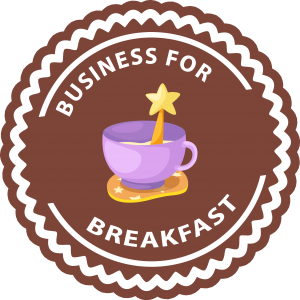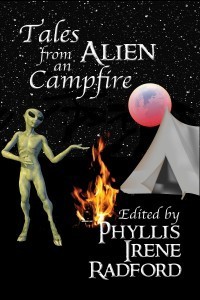Leah R. Cutter's Blog, page 12
March 19, 2015
Business for Breakfast V1: Chapter 10
The following is a chapter from Business for Breakfast, Volume 1: The Beginning Professional Writer.
The ebook is available from Amazon, Kobo Books, Barnes & Noble, iBookstore, and the paper version is available from Createspace.
However, if you’re like most writers (broke!) I will also be posting a chapter a week, so you’ll merely have to have patience to read all twelve chapters.
Chapter Ten
The Physicality Of Writing
Most writing takes place between your ears. You play head games with yourself and your characters.
But writing is also a physical act. If you’re dictating your words, it’s less so. More so, though, if you’re typing.
This chapter addresses some of the physicality of writing.
Separate Computer
As I’ve mentioned in a previous chapter, I build habits. Habits help me write more, better, faster.
One of the things I’ve done to encourage my writing habit is to get a separate writing computer.
Every time I sit down at this computer, the only thing I can do is write.
There is no internet connection on this computer. There are no games. There is a word processor and a spreadsheet program. That’s it.
I got this computer fairly cheaply online, refurbished.
Some people don’t work well with a second computer, or they can’t afford the expense. Instead, they’ve set up a second user on their primary computer.
That user has no access to the internet. No access to games or anything other than their word processor.
This way, when the writer signs in with this writing user, they are creating the habit and setting the expectation that it’s time to write now.
Some have even gone so far as to have a different background as well as a different screen saver for that user, so when they sign in with this user, there are more visual cues that it’s time to write.
No Internet
But I just need to look up this one thing…
Then it’s two or three hours later and there aren’t any words on the page.
Some people use “Write or Die.” Or maybe they have a program that throws kittens at them when they complete so many words.
If I relied on that type of external reward for writing, I’d burn out. As a fulltime professional, my motivation and rewards must come from the inside.
So again—no internet. It disturbs the flow of the creative voice. Trust me on this one.
RSI
Those three dreaded letters: RSI. Repetitive Stress Injury.
Basically, it means doing the same action over and over again until you’ve injured yourself.
Friends have likened RSI to feeling as though knives were being thrust into their wrists every time they tried to type.
This really interferes with the writing, you know?
But RSI is not inevitable. There are things you can do to help prevent getting RSI.
Breaks
You’ve started writing. You’re in the flow. Now I expect you to take breaks?
Yes.
Again, typing or writing things out by hand is a physical activity. You need to take breaks. No matter if you’re in the flow or not. Start teaching yourself to take breaks every hour.
For those who handwrite, use a timer. Take a break every hour. Get up, stretch, etc.
If you’re on a computer, I recommend workrave.org for those on PCs and dejal.com/Timeout for those on Macs.
I have mine set to give me a thirty second break every twenty minutes, then at every fifty–five minutes to take a five minute break.
The workrave.org program also gives you stretches.
When I started using these programs, I labeled them my productivity software.
By taking regular breaks, I’m able to work more hours during the day. I’m also able to work harder, because I know that a break is coming.
So take breaks. Your body and your mind will thank you for it.
Stretches
When you take your five–minute break every hour, one of the things you should do is stretch.
If you do an internet search for “RSI Stretches” you’ll find a lot of advice. Most of what I’ve seen, though, doesn’t cover enough. Merely stretching your wrists and hands isn’t good enough.
Some of the muscles that need stretching are in your armpit. Raise your hand over your head and place it on a wall, then lean into it gently. This will stretch those muscles.
Be sure to also stretch out the muscles across your chest. And your neck and shoulder muscles.
Ergonomic
I use a combination of boxes and computer stands in order to achieve an ergonomic desk arrangement with my laptop and keyboard. For me, it’s all about looking up and not looking down while I’m working. My neck and back seem to be more sensitive to incorrect posture than my wrists and shoulders. At least for now.
Do what you can to get your monitor raised so you’re looking up. Your hands and wrists supported. Your keyboard at the proper height.
Again, see if you can get refurbished equipment somewhere so you’ll have the right stuff that works for you and will help prevent injuries.
You’re in this for the long haul. That means keeping your body in shape.
Standing
I actually stand most of the time when I write. There are times when I sit. I find I sit when I’m writing close, intimate scenes. But when I’m writing scenes with a lot of action, standing works better.
It took some training for me to be able to stand when I wrote. I know it isn’t for everyone. But I feel so much better when I spend the day standing instead of sitting.
You don’t have to get the top–of–the–line standing desk. You can jerry–rig something. Then maybe after your first best seller, you treat yourself to a proper standing desk.
But try it. You may like it.
Treadmills
I, personally, am not steady enough to walk and write. I’m also not “there” enough when I’m writing. The rest of the world completely disappears and I’m afraid I’d hurt myself if I tried walking and writing.
But I know some writers who swear by their treadmill desk. Claim it makes them more productive. More creative.
There have been lots of studies that show that movement will improve your creativity. So I believe the writers who can do this.
Again, you can always jerry–rig something that works for you.
There are people who dictate their writing while they’re walking. This way, they’re not limited to a treadmill, but can take a hike and still write. I’m not to that stage yet, but I have considered it.
In Conclusion
Here are the three things you need to remember about the physicality of writing:
Separate your writing space from your regular workspace. This helps build the habit and expectation that all you’re going to do is write when you go there.
Stretch and take breaks.
Try to write standing up, or even walking. You may be surprised at the results!
This book is available from Amazon, Kobo Books, Barnes & Noble, iBookstore, and the paper version is available from Createspace.
Crossposted from my website. If you'd like to comment, you can do so here or there.
March 18, 2015
The Three Day Roast

No, I’m not actually roasting coffee beans for three days.
However, some beans take longer to reach their full potential.
When last we met with our intrepid explorer, she’d roasted some Columbian beans that were good. Even by the third day, though, they were still just merely good.
So the next batch of that Columbian bean, I roasted for an additional minute and a half.
The difference between a city roast and the darker, espresso roasts is whether the beans go through both the first and second crack. Once the beans reach the second crack, you’ll start to lose the flavor of the bean and pick up more of the flavor of the roast.
I prefer beans that are more lightly roasted. So this second batch, I pulled off just as they started the second crack.
This batch was much like the previous batch. The first day was good, the second day better.
However, the third day made all the difference in the world.
By the third day (yesterday) the beans had finally found their full potential. It was an amazingly good cup of coffee. Full body. Nice acid at the end. Rich and flavorful.
This was very, very close to my nirvana roast. I would happily drink this roast forever. (Of course, I only roast small amounts of beans, and I’ll be out today or tomorrow! eeek!)
What more would I like? A touch more of the bean taste.
I believe the way to achieve that is to lengthen the time between the first and second cracks. That’s where you get all the flavor with these beans.
So after the first crack, next time, I’ll lower not only the temperature, but the fan, try to bring out more flavor in the bean.
However, I won’t be trying that right away. I’m out of the Columbian beans. Next up: Tanzanian peaberry beans. Wish me luck!
Crossposted from my website. If you'd like to comment, you can do so here or there.
March 17, 2015
New short story now available!
I have a short story in a new anthology that’s available today!
The anthology is Tales From an Alien Campfire. It’s edited by Phyllis Irene Radford.
The idea for the anthology was developed while I was attending Campcon — a kind of camping/writer’s retreat. Since we were out in the wilderness, we decided to do a collection of short stories that were science fiction, but out in the woods, not urban.
Here’s the blurb:
People have loved to go camping in the great outdoors ever since our ancestors escaped the great outdoors to discover the joys of indoor living.
Here, twelve veterans of the camping experience, both seasoned and new authors, present tales born in the woods, home grown around the campfire in the oldest of storytelling tradition.
Join in as they tell their tales, some serious and some silly. Stories borne of time spent with an audacious Pug mascot, good food, decent wine, and some spooky howls deep in the woods. You will find aliens: They want more than our women–they want that perfect vacation. Experience an attempt to reclaim a devastated Earth by camping out and exploring. Is it really a Sasquatch snitching the French toast? All of this and more are tales told around an Alien campfire.
My short story is called, “Out of the Woods.” It’s a post-apocalyptic pulse pounder. Because that’s the way I roll. It’s a Leah Cutter story. (Which, according to Kevin J Anderson, means it’s about two middle-class white girls from suburbia. Right? That’s all I write, doncha know.)
Tales From an Alien Campfire is available from your favorite retailers.
Crossposted from my website. If you'd like to comment, you can do so here or there.
March 13, 2015
Happy Cataversary to Me!
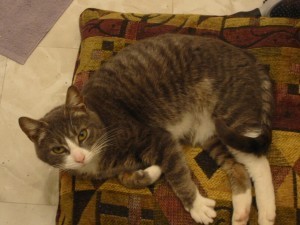
Kiera early days
Yesterday marked the ninth anniversary of me bringing my darling kitty, Kiera, home from the shelter. They estimated she was a year and a half old, but didn’t know for certain, as she was kind of small. I’ve always considered the anniversary of bringing her home kind of her birthday. So she’s about 10 now.
She’s a happy kitty, though of course she would maintain that her minions are very poorly trained. I had a health scare with her recently, but she seems to be fine now. She’s a bit more neurotic than most cats. She’s also really smart, comes when she’s called, and seems to understand much of what I say to her.
She’s my constant companion, frequently wanting to hang out in whatever room I’m in. She makes me laugh, and nothing else gives me as much contentment as when she’s curled up next to me, purring.
Fair warning – LOTS of pictures ahead!
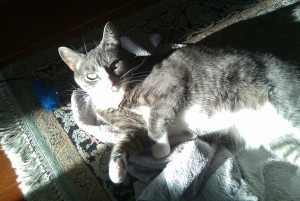
Keira waiting to play
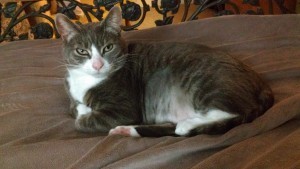
Kiera comfy and waiting
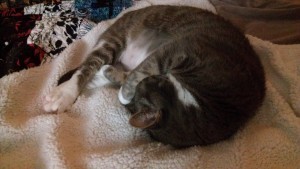
The sun’s too bright!
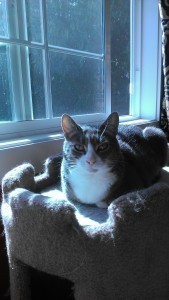
Kiera and her castle
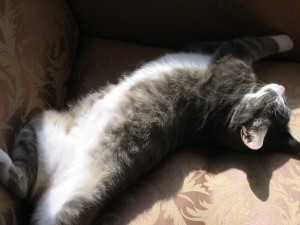
Twisted back lunge. Obviously so stressed!
Crossposted from my website. If you'd like to comment, you can do so here or there.
March 10, 2015
The Morning Coffee
 Yesterday, I roasted a fresh batch of coffee beans. This morning I had my first cup from those beans.
Yesterday, I roasted a fresh batch of coffee beans. This morning I had my first cup from those beans.
One of the lovely things that I’ve discovered from roasting my own beans is that generally, they smell different when they’re whole, in the canister, from when they’re ground. Because of my cold, I couldn’t smell all the differences between the two forms, but the ground did have berry notes that the whole didn’t.
When I made the coffee, I was rather impressed by how smooth it tasted. I generally put cream in my coffee because it mellows out the bitterness. This batch of beans is so smooth I could drink it without cream–there’s no bitterness.
It’s a really good cup of coffee. Very close to what I would call my nirvana roast.
The only thing I would change? It’s still a bit green at the end. I would like something just a shade darker, more robust. Will roast the beans maybe 5 seconds longer next time.
But damn. I’m so pleased at how good this tastes!
Tomorrow, the roast may taste different. It can take as long as three days to get the full flavor of a roast. I’m looking forward to more madcap experiments!
Crossposted from my website. If you'd like to comment, you can do so here or there.
March 5, 2015
Business for Breakfast V1: Chap 8
The following is a chapter from Business for Breakfast, Volume 1: The Beginning Professional Writer.
The ebook is available from Amazon, Kobo Books, Barnes & Noble, iBookstore, and the paper version is available from Createspace.
However, if you’re like most writers (broke!) I will also be posting a chapter a week, so you’ll merely have to have patience to read all twelve chapters.
Chapter Eight
Writing Comes First
I was in my mid–thirties before I made a serious commitment to my writing.
Oh, I was always writing. And finishing short stories. And sending them to magazines (and getting rejected!).
But in my mid–thirties, something clicked. I found a story (or that story found me) and was dragged into it. I had to write every day. The story demanded it.
Then I found another story. And another.
And I realized that before, while I’d claimed to be a writer, the writing wasn’t that important. Many, many other things came first.
If you want to be a professional writer, the writing must come first.
In this chapter, I talk about some ways to help you put the writing first.
The Early Years
When I first made the commitment to my writing, I felt as though I was being very harsh. I judged everything in my life: the day job, the boyfriend, my other friends, my working out, my cat, everything.
I looked at every piece of my life and asked one simple question:
Does this support the writing?
If so, great!
If not, I jettisoned it.
Then I went through the whole process again, six months later. And again, six months after that.
It was a time of great purging for me. I lost friends. But they weren’t really friends, not if they made fun of my writing, or didn’t understand that I couldn’t go out with them that night because I was writing.
This is tied directly to self–confidence. I hadn’t sold anything. I was still trying to figure out what it meant to be a writer.
But I had the self–confidence to put the writing first. This is why the chapter on self–confidence comes before this one.
You must believe in yourself. A supportive spouse is awesome, particularly one who won’t let you quit after your two–hundredth rejection. But you may not have a spouse. You have to believe in yourself. Do it on your own.
WIBBOW (pronounced “wih–bow”)
Scott William Carter is the one who originated this acronym. It’s a great yardstick for measuring all the other activities that people tell you that you must do, like talking with fans on Facebook, like doing a blog tour, like setting up a signing.
It stands for:
Would I Be Better Off Writing?
There is one piece of marketing that works for all writers, in all genres, to increase sales:
Writing and publishing the next book.
You’ll see a bump in sales of previous books when you release the next book. Particularly in a series. (It’s all part of that slow and steady drops to trickles to streams.)
So when someone asks you to do something, fall back to WIBBOW.
Would I be better off writing the next book, the next chapter, the next story?
It’s less harsh than my original question, but just as important.
Most of the time, when you’ve reached a situation where you have to ask this question, the answer is yes, I would be better off writing.
There are times when the answer is no. For me, I’ve found it has to do with relationships and family. Sometimes someone needs me and it’s better for me to be with them.
Honestly, though, 99% of the time, when I ask myself if I’d be better off writing, the answer is yes.
How?
So how do you make the writing come first? How do you consistently answer yes to WIBBOW?
As I mentioned before, you have to have some level of self–confidence. Your writing is important to you. You are important to you. So put it first.
What does that mean?
Turn off the TV. I got rid of my TV years ago. When I want to watch something, I can always watch it on my computer.
Remember—you are a creator of content. Consuming content is not creating.
Stop reading blogs. I will admit that I still get sucked into reading a lot of blogs, tech blogs and business blogs and writing blogs. I’ve had to purge my reader more than once as I pick up more and more.
Get off Facebook and social media. I know, I know. It’s a party out there, and you’re afraid you’re going to miss something.
In a year from now, when you look back, would you have rather watched the latest viral video ten times or written another novel?
Negotiate time for yourself. If you’re living with someone, you need to communicate with them about your needs. They can’t support you if they don’t know that you need this time to write. Don’t get angry at them for disturbing you if you haven’t explained just how important this time is.
This can include negotiating with your boss at your day job as well. As far as my day job was concerned, I had a “life conflict” early in the morning, every morning, and couldn’t attend early–morning meetings. The boss doesn’t need to know that’s your writing time—make up a story about kids or your spouse or your parents or what have you. (Unless you have a supportive boss, which is awesome.)
Get a different job. Seriously, if you’re working sixty–plus hours a week and are having difficulty writing because you’re mentally exhausted all the time, find a different job. I know that’s difficult. It isn’t impossible.
How badly do you want to write? How strong is your hunger?
I negotiated a thirty–hour–a–week job for the day job, taking a pay cut, so I could write in the mornings.
The writing comes first.
In Conclusion
Here are the three things you need to remember about the writing:
The writing comes first. Jettison those things that don’t support that.
WIBBOW. Would I be better off writing? Most of the times, the answer is yes.
Purge what you can so when you look back in a year, you’ll have another novel, not a bunch of Facebook “friends.”
This book is available from Amazon, Kobo Books, Barnes & Noble, iBookstore, and the paper version is available from Createspace.
Crossposted from my website. If you'd like to comment, you can do so here or there.
February 16, 2015
Goodreads Giveaway!

Woo AND hoo!
I’m giving away five paper copies of the novel that’s coming out next week over on Goodreads.
Here’s the blurb:
Hikaru and her one true love Norihiko defy their families and kitsune (fox fairy) tradition by getting married.
However, an evil magician kills Norihiko, steals his soul, then re-forges it into a sword.
Hikaru seeks the sword, determined to break the curse and bring back her one true love, no matter the cost to herself or her family.
Set in Heian era Japan and composed of three novellas: The Making, The Breaking, and The Reforging.
—-
The giveaway will run from the 16th through the 20th.
So go! Sign up! I’m giving away five copies of the book.
Crossposted from my website. If you'd like to comment, you can do so here or there.
February 12, 2015
Business for Breakfast V1: Chapter Five
The following is a chapter from Business for Breakfast, Volume 1: The Beginning Professional Writer.
The ebook is available from Amazon, Kobo Books, Barnes & Noble, iBookstore, and the paper version is available from Createspace.
However, if you’re like most writers (broke!) I will also be posting a chapter a week, so you’ll merely have to have patience to read all twelve chapters.
Chapter Five
Income vs. Profit
So you’ve sold a story to a major short story market. Congratulations!
Quick quiz: Is that income? Or profit?
This chapter discusses the differences between income and profit, as well as delves further into expenses you can expect to incur.
Income
The above is actually a trick question.
The money from a sale may be income.
It may be profit.
The difference between income and profit are your expenses.
Income is all the money that comes into the writer, generally from licensing rights to your property (remember, though we always talk about sales we, as artist/writers, aren’t actually selling stories).
Every drop, every trickle, every stream is considered income that come into a writer’s money bucket.
Expenses
Expenses are made up of the money you spend to run your business.
For example, paying for the services of a copyeditor is a normal business expense for a writer.
If you are publishing your own work, you may pay for a cover. That is another normal business expense.
Perhaps you have a website. The annual expense of registering that domain and paying for web hosting are normal business expenses.
Expenses take money out of the bucket of income.
NOTE: Be careful on how much you spend out of that bucket if not a lot is trickling in! Spending $5000 on a short story cover and advertising makes no sense.
Profit
Profit is what remains of your income after you subtract your expenses.
So you have income, which is money flowing into the bucket.
Expenses are things you purchase for your business, which means money flowing out of the bucket.
Profit is what remains in the bucket after the expenses.
Think about your subdivision of properties.
You need to water the yards there. Or paint the houses. Or build new houses.
All of these are expenses that you spend out of your income.
Businesses are always trying to find legal ways to maximize income and minimize profit.
Why?
Taxes.
The less profit you have, the lower your taxes may be.
Again, I am not a tax professional and I am not giving you tax advice.
However, if you have enough legitimate expenses from your business, you may be able to lower all of your taxes.
Accounting
So, in the last chapter, I talked about intuitive budgeting.
The whole income vs. profit is why you must keep your receipts, and why you must keep track of everything you spend for your business, and possibly for your life.
What sort of expenses do you need to keep track of?
Website domain
Email forwarder (from your domain to your regular email address)
Privacy service on your domain registration*
All editing
Cover artwork and design
Writing computer (more about this in The Physicality of Writing chapter)
Office equipment, such as your computer, a printer, your standing desk, etc.
Postage (if you’re mailing manuscripts to editors)
Scans of signed contracts
General supplies, like pens, paper, Post–it notes, etc.
Software used specifically for writing and publishing
Backup devices
*SIDE NOTE: All domain registration information is public information. Which means that your name, address, and phone number are all easily accessible if you do not purchase a privacy service from your web host.
You may want to set up a home office and declare that on your taxes. The rules are fairly strict, however, about how general area and percentage that it’s used for just your business, so be careful. The rules can be found on the IRS site about business expenses.
In Conclusion
These are the three things you need to remember about income vs. profit and expenses:
Income is the money that flows to the writer.
Expenses are the services you pay for running your business. Be careful with your expenses.
Profit is what remains after you subtract your expenses from your income.
This book is available from Amazon, Kobo Books, Barnes & Noble, iBookstore, and the paper version is available from Createspace.
Crossposted from my website. If you'd like to comment, you can do so here or there.
February 5, 2015
Business for Breakfast, V1: Chapter Four
The following is a chapter from Business for Breakfast, Volume 1: The Beginning Professional Writer.
The ebook is available from Amazon, Kobo Books, Barnes & Noble, iBookstore, and the paper version is available from Createspace.
However, if you’re like most writers (broke!) I will also be posting a chapter a week, so you’ll merely have to have patience to read all twelve chapters.
Chapter Four
Intuitive Budgeting
On certain topics, I am a contrarian.
I believe this is in part because I am an artist. In order for me to be able to do my art when society tells me I can’t/shouldn’t, I have to be able to tell society exactly which bridge they can jump off of.
Budgets are one of those hot spots for me.
If you tell me I must go on a budget, I will—not consciously, but unconsciously—break something, so that I can no longer stay on a budget.
I am a rational person. I understand budgets are good things.
For me, and for other artists I know, budgets are worse than straitjackets. Just the thought of having a budget will drive them (and me!) crazy.
However.
I am also a professional. I run more than one business. I need to know what money is coming in and where it’s going out.
So I have developed what I call intuitive budgeting: a way of understanding my cash flow and being able to make corrections without having to put myself on a budget.
By the end of this chapter, you should have some ideas for how to set up your own intuitive budgeting system.
Why Budget?
One of the things people don’t tell you is why you need to budget.
You don’t, actually.
What you need is a budget. That is, you need to know how much money you’re making as well as spending over a particular period of time.
Why do you need to know this?
So you can make adjustments as necessary. As things change, and drips accumulate, or perhaps dry up, you need to be aware and adjust.
You don’t need to give yourself only X amount of money to spend on coffee every month.
You do need to know how much you’re spending on coffee every month, and make adjustments if necessary.
Automation
If you are just starting off trying to figure out your finances, I would recommend starting with I Will Teach You To Be Rich by Ramit Sethi. His audience is twenty– and thirty–year–old people who have their first paychecks coming in; he tells them what to do with those paychecks. He writes in a very casual style that’s very readable.
Fair warning—he also calls people idiots. This is not a guide for someone who is overly sensitive and needs a lot of handholding. He expects his readers to be smart. I found the book very refreshing.
I also discovered that I was already doing 99% of what he suggested.
I luuurrrve the internets and the modern day we live in. I take full advantage of as much automation as I possibly can in terms of my money.
What do I mean by automation?
If you are working for a regular company, chances are, your paychecks are automatically deposited into your account. If you’re selling your work regularly through the usual distribution channels (Amazon.com, BarnesandNoble.com, Kobobooks.com, etc.) you’re having those checks automatically deposited into your account.
This is automation that those companies have put in place regarding what they pay out.
You can set up the same sort of automation for yourself and the bills you pay.
If you own a house, your mortgage is probably automatically deducted. Maybe your heat and other utilities as well.
But wait! That’s just money flowing in and out. No accountability.
Don’t worry. This is just the start. Now let’s dig into more details.
Alerts
Every credit card, as well as most banks, are happy to email you information about your accounts on a regular basis.
For example, you now have a credit card that’s dedicated to your writing business. There won’t be a lot of charges on it. One of the ways to track that card is to have the credit card company email you every time there’s a charge made to that card.
This helps protect you against fraud—particularly when you get an email as soon as charges are made (and you didn’t make them!).
I also have the credit card people send me an email every morning with my balance. This way, I know exactly what is on every card.
But how does this help you keep track of what you’re spending on?
Balances
I keep receipts. But I also buy 99% of everything using cards.
Most credit cards, and possibly your bank if you’re using a debit card, have calculators—pie–charts—that show you where you’ve spent your money that month.
Instead of telling myself that I only have a specific amount of money to spend on something, I track at the end of a month (or, for me, more realistically, the end of each quarter) and see what I have been spending my money on.
By doing this sort of “after the fact” budget, of seeing what I was actually spending money on, I’ve been able to keep on track in terms of not spending more than I’m making.
For example, it became very clear at the end of one quarter that I was spending way too much money on coffee shops. Because I could see my spending patterns, I was able to make changes.
Cash
This system of automating everything works if you use credit cards for everything, and you pay them off completely at the end of every month. (Me, I’m pathological about debt. I have none. Your mileage may vary—YMMV.)
But what if you use cash for everything? I understand that level of paranoia, of not wanting to pay off a large bill at the end of every month.
Then you must keep receipts. And you must then enter them into a program like Quicken or Quickbooks.
I know, I know. Not very intuitive.
However, cash is one of the easiest ways to lose track of your money.
You may think you have better control of your cash. And possibly you do, if you only spend cash on specific items.
But chances are, you spend cash on a lot of things. And you don’t track your receipts. So you lose track of where you are and you end up in a hole.
I know too many artists who get into holes and then end up digging a deeper one.
Accounting
At the end of every quarter, I put all of my expenses into an accounting program. I’ve used GnuCash, but have now switched over to Quicken.
Since I’ve used credit cards for everything, it’s very easy to enter receipts and assign my expenses to the correct category.
I know people who do this every week. I can’t. I tried. Too much like a budget.
Instead, I buy a nice bottle of wine at the end of every quarter that I don’t allow myself to open until I put in my receipts. (Carrots work much better than sticks for some artists.)
I can see that bottle of wine sitting there, unopened on my counter, every day, until I go ahead and enter in my receipts.
Online Programs
You can also use an online tracking program, like Mint.com, for tracking your money. They have great charts showing you where you spent everything. You can download the reports to automatically enter into your own accounting software. Etc.
The problem? I have to give them the password for my bank account. And my credit card account.
How secure are they? You hear about companies being hacked all the time.
Do I want all of those passwords stored on a site I don’t control?
Maybe it’s fine. Maybe they’re never hacked. Or maybe you’re willing to take the risk.
It’s up to you how you track your money.
But you can’t make adjustments to your spending, which is all about what a budget is supposed to be used for, if you don’t know what things you’re spending on.
In Conclusion
These are the three things you need to remember about intuitive budgeting:
The purpose of a budget is to track your money so you can make adjustments if necessary.
Use automation, such as emails from your credit cards or bank, to help you keep track of everything. Also use the online tools provided by your bank or credit card to determine which categories you’re spending too much money in.
Enter your receipts into an accounting program from time to time. Some people do it weekly. I do it quarterly. Others do it annually. But you must keep track of what you’re spending where so you can make adjustments.
This book is available from Amazon, Kobo Books, Barnes & Noble, iBookstore, and the paper version is available from Createspace.
Crossposted from my website. If you'd like to comment, you can do so here or there.
February 3, 2015
Experiments with roasting
As I mentioned in my previous post, I got a coffee bean roaster for Christmas and have been having mad, wild science experiments with coffee beans ever since.
My roaster came with five pounds of green beans. I got two pounds of what they describe as “starter beans.” These are beans that handle heat well and produce coffee that you’ll be familiar with.
I’ve been happy with the roasts I’d made. It’s been great fun trying to figure out how to achieve my nirvana roast.
Yesterday I roasted my first batch of non-starter beans, the Ethiopian Moka Harra beans.
These beans did not roast evenly at all. I’m going to try the instructions I found here with the next batch I roast to see if I can get a more even roast.
This batch of coffee beans smell absolutely heavenly when I ground them. However, the taste isn’t as rich as the smell. Possibly they need to degas more. I’ll try the beans again tomorrow, see if they’re richer then.
In addition, I’m going to roast these beans longer next time, particularly between the first and second cracks, see if I can get a more robust flavor. The berry notes I can taste — it has a very nice light finish. I’d still like it a bit heavier at the start.
So this is what I continue to geek out about! What have you been geeking out about lately?
Crossposted from my website. If you'd like to comment, you can do so here or there.

